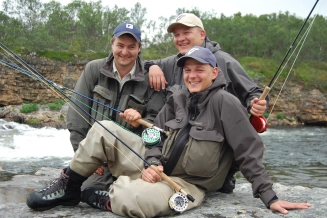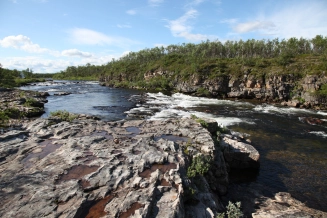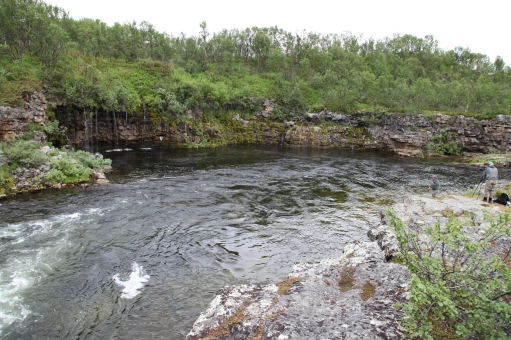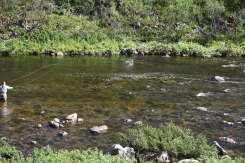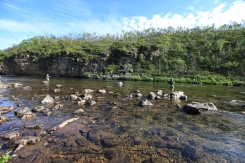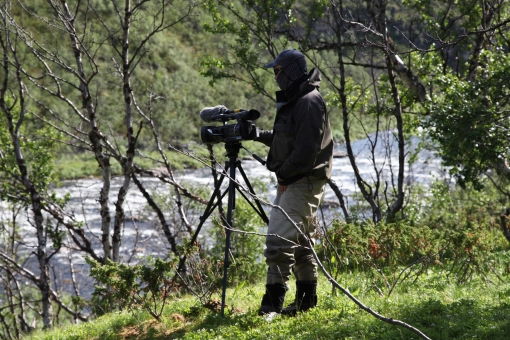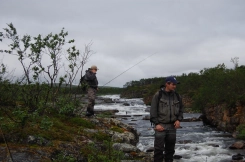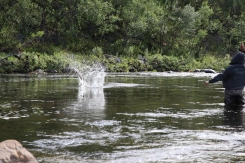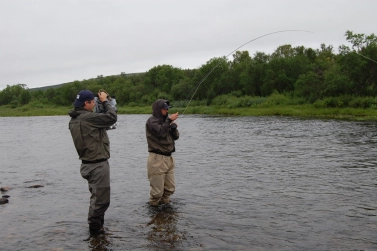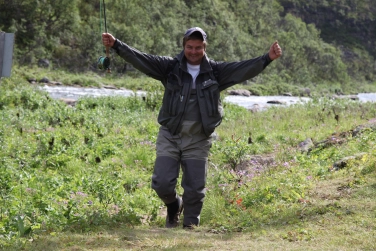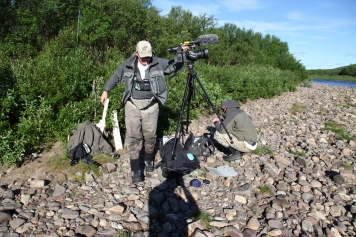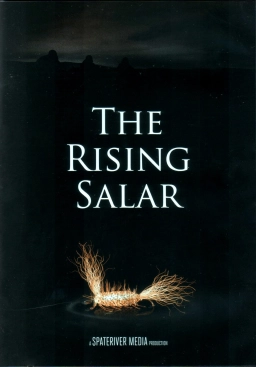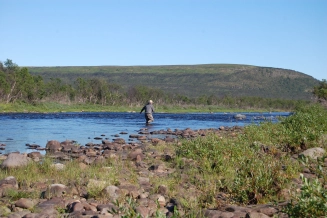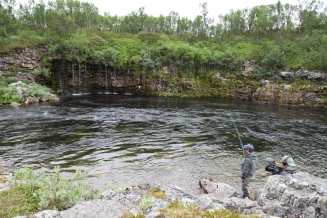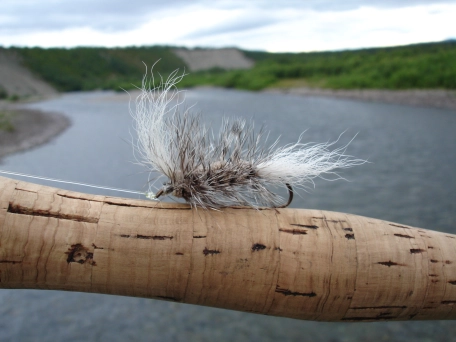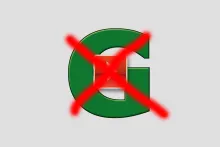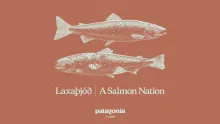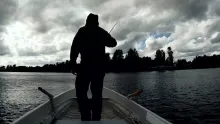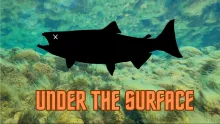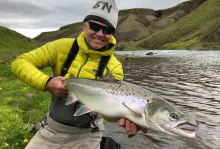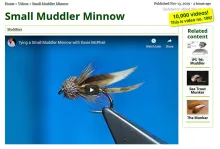The DVD Rising Salar takes a different approach to doing a fishing video and we have talked the the three guys behind it.
We have talked to the guys behind the video The Rising Salar - two Danish brothers and a Norwegian. We have reviewed the DVD here, but thought it would be fun to talk to the guys behind this somewhat different fishing video about their motivation and the process.
The three producers and film makers are the two Danish brothers Dennis and Henrik Petersen and Norwegian Roar Velle, and they agreed to take turns and answer a few questions. Here are their basically unedited replies.
What got you to start making a fishing video? None of you seem to be in the business.
Roar:
At first it was to create memories of fishing trips with friends. However, due to cheap but good quality technology it made it interesting.
Then it became like salmon fishing… the need for discovery. A pool around the next corner cannot be left unchecked. There is also an element of making something better then you did last time. As you do when you're casting out the fly-line; Always searching for that perfect cast which could also result in a catch of your dreams.
Dennis:
As Roar explained, we started out making "home movies" and then caught interest in the concept of making fishing movies. To add to Roar's comments, I also think we wanted to share the real salmon fever and true happiness we experienced.
I think there's an old saying about happiness is to actually share happiness, or is that in another context? I can't remember.
The challenge of making a storyline was the next step for us - whether or not it succeeded, and/or to which extend, that's for everyone else to judge. Both Henrik and I are in the IT business, while Roar likes to play around with numbers (Accounting), so one could correctly claim that we're not the type of persons normally appearing in movies - for a good reason!
Henrik:
I didn't really have a choice (Dennis forced me!). ;)
Henrik:
I didn't really have a choice
Henrik and Dennis are obviously brothers, but how did you meet Roar and the others who have helped?
Dennis:
Meeting Roar was a complete coincidence. My uncle, Henrik and I rented a mountain hut in southwestern Norway, as we wanted to go fish trout in the mountains. The owner of the hut told us about a salmon river close by, and if we had any question we could just contact Roar. Long story short, we ended up fishing together one day, and we just hit off - So you can say that Henrik and I met Roar together at the river.
Since then, which is almost 10 years back now, Roar and I have been fishing salmon together almost every year, with Henrik tagging along every year the last 5 years or so.
Nicholas, the narrator, is a friend of mine. I also met him completely by coincidence. We met in tackle shop in Copenhagen some years back. Nicholas is a passionate and very skilled fly-fisher. His fishing of choice seems to be grayling and brown trout in the UK chalkstreams, salmon fishing and now also coastal sea trout.
The sea trout part might have something to do with his numerous trips to Denmark, where we hunt those bright sea trout together - I can't say :-)
We actually wrote the narration during long evenings, directly after 12 hours of fishing on the coast during the day - for several days in a row.
The guys "acting" in the beginning of the movie are all colleagues of mine - At my "real job". Basically i just asked them if they would like to help me by shortly participating in a movie about salmon fishing - I managed to convinced them that they shouldn't say anything and just be "extras".
Obviously, it wasn't completely what happened for one of them, but hey, they thought it was fun to try too, and I "got the shots" I wanted :-)
They all know I'm completely obsessed with Atlantic salmon fishing, and that I always preach "Don't eat farmed salmon!" every time there's salmon in the canteen. I guess they just went with it, hoping they made a contribution to something that would make me shut up at the canteen - Not going to happen :-)
Throughout the years we've met a lot of great people while driving around in Finnmark. I think the most important was Ronny, a guy from southern Norway, who taught us this way of salmon fishing. We met him and his son Richard, while shooting the footage for our second movie, 6 years ago - They were the inspiration and basically the original reason for us making this movie.
Henrik:
Dennis, introduced me to Roar, on our first salmon trip ever.
One of the really great things about salmon fishing, is the companionship you experience along the rivers. It doesn't matter what river you're at, or which country it is - When you meet someone along the river, you all share the same passion, and therefor are some kind of friends. This is one of the benefits of salmon fishing, that does not include the fishing itself, but it's a big part of the culture around salmon fishing - that I appreciate a lot.
Why scripting a story rather than just filming the fishing?
Dennis:
We could easily have made hundreds of hours of "documentary", or "fish-porn", or a "we know it all - you have to do it like this" movie. Instead we took a decision halfway into the project. We wanted to make something that wasn't like almost every other movie about salmon fishing out there. We believed that we were on to something that was unique - getting the salmon taking dry flies on film - and wanted the movie to be one of a kind too. If we made a storyline, rather than making it as documentary- or instructional style, we could make it more than just "people catching fish" on video. We chose to use the real story of our own change from traditional salmon fishing to using dry flies as a baseline for the story. The things that happened during the years, the people we met and how we reacted when we got obsessed with this - all has been added to the storyline in hopes of making it both funny and something people can relate to.
That being said, and due to us being amateurs on this matter, the script were changed so many times during the shootings, that i've lost count.
I can reveal to everyone - it's easy to make a documentary- or instructional fishing movie. Making a real storyline - that keeps the viewer's attention - is probably the hardest thing we've ever tried. (Not claiming we succeeded to the extend we hoped for.)
Without making any comparison what-so-ever, it has shown us how much work it takes to get a story on paper to work on film. The theory behind making a story is a science in itself. The 3-act structure is just one part among a long list of theories professionals use. It suddenly makes watching a movie on TV much more interesting, when you notice the theories used, the use of music/sound to emphasize a mood or just how real actors act. Watching a movie will never be the same again - Probably as much annoyance to our girlfriends :-)
How did you all feel having to "act" to the camera in order to catch the dialog and carry on the story?
Dennis:
I'll put it this way - The script included much more dialog than the final movie ended up with - Thank god for a narrator! We had to bring the script on our trips, because no one could remember their lines. Looking into the camera, when not intended, were a big problem too. We suck at acting, really, we do.
Yet we hope that people notice that we did have quite a lot of fun attempting to act in front of the camera, and that the story is communicated well enough, despite our poor acting skills :-)
Henrik:
This is something that will never come natural to me. I've lost count of the times we had to reshoot a scene, because we/I messed something up. The further we got into the project, the "easier" it became - But it is very clear to me, I will never want to be an actor - Not that i'm even close to consider myself as one.
No matter how many times I see the scenes, which were "acted", I never get comfortable with them.
We only had a limited amount of time along the rivers, so when we had to shoot the scenes, I was generally much unfocused. When you know that a 10kg + taking your bomber is within reach, you can't help thinking: "Why am I standing in front of a camera - not fishing?"
Roar:
I hated it!
Roar:
I hated it!
What were the challenges in filming and editing the video?
Dennis:
- We started out with a standard definition camera, 5 years ago, but after a year we realized we had to buy a new HD camera, and we discarded all the footage. It was also at that time, that we thought we were on to something unique, and that we needed a better quality camera and sound equipment to make it good. At that time we decided to make it as a story instead.
- Carrying all the equipment together with the regular fishing gear up and down the various rivers, that was a challenge physically.
- As mentioned already, the acting was really a challenge.
- At one time we also decided to try get some aerial shots, so we had to learn how to control a quad copter (drone), which were absolutely not easy (nor cheap), and still isn't.
- We had stepped up from consumer to pro equipment, so technically the challenges in filming was getting to know the new camera and sound equipment.
With regards to editing it's like a chain reaction. If you step up to pro equipment one place (in this case the camera), soon you'll find out that, that's not going to cut it.
New, and more expensive, hardware for your computer are just one part of it. Then comes the actual editing software, and all the extra "plugins" you suddenly need to buy too.
When you're able to edit the footage from the new camera without your computer being annoyingly slow, then you find out that you know absolutely nothing about sound, when it comes down to it.
How do you remove unwanted sound from footage that you cannot redo? It's a science in itself too.
When you have good quality sound and video, and you have been editing for months, then someone asks you: "What about color grading?"
My point is: You need to invest a lot of time, if you want to do everything yourself. Every aspect of making a movie is a science in itself, when you start to dig into it.
How did you get the DVD financed, produced and distributed?
Dennis:
We wanted absolute freedom to do what we felt like, and we didn't want any commercial thinking in the movie. It's actually just like the past ones we made.
The DVD is 100% financed by Roar, Henrik and myself - All the trips to northern Norway, every single piece of fishing equipment and all the camera/sound equipment.
The original music was made by a friend, who recorded it in his own studio. The same studio as the voiceover was recorded. We did all the editing, color grading and authoring ourselves.
The production of the DVD is made by a professional company using a so-called glass master - a technology that used to be way too expensive.
The distribution was, and still is, hell. One thing is the declining DVD market, another is the lack of interest from distributors due to lack of "their own products".
Regardless, we're now distributing it ourselves to interested tackle shops and the like. We did consider selling directly to the end-viewer, but we also have a normal job, and can't go to the post-office every day.
Do you think others can do the same - and would you suggest them to do so?
Roar:
There were two Norwegian flyfishing DVDs which came out annually, and both were in the same category as ours: Polarflua and Glalaks.net. I would strongly recommend to watch their videos. I prefer to see fishing movies from "salmon bums" which fishes in waters that is possible to visit yourself.
In some way you can relate more to such movies, and you can discover a lot, even as an experienced fisherman. We are well aware of that there can be opinions about revealing good fishing spots due to filming.
The amount of information that is available in society today is enormous, and so we don't see it as a problem to make a movie from parts of different rivers, when there are so many places to go.
Henrik:
Yes I think so - If you got the passion... and enough time
Dennis:
When we can do it, so can everyone else. It's a matter of how much effort you put into it, i think. It does takes a lot of time to get into all the aspects - It was a whole new world for us when really started to dig into them.
Of course it helps quite a lot to have a fair amount of IT knowledge, especially when it comes to the steep learning curves of editing, color grading and authoring software.
For example - It took me more than a year to learn how to fly a quadcopter (drone) myself, and im still shaking like crazy when I attach a camera on it, and I'm still not very good at it - But it was a fun and very educating experience.
To me the hardest part wasn't really all the technical stuff, it was by far making a real storyline with Roar.
If others want to make a fishing movie with a storyline, I'd suggest - without any doubt - to prepare, prepare and prepare. When you are completely done and satisfied with your storyline/script, then think through every scene before you go shoot the movie. Angle, lighting, location and time of day etc.
We didn't do that good enough in my opinion, and it also resulted in lots of changes to the script, and even the storyline, when we were actually shooting.
There's one thing I'd like to point out. If you have to finance everything yourself, as we have done, you need to sell an unrealistic number of DVDs to earn anything at all. Economically, it's REALLY bad business, so if you're looking to quit your day job, you need to look somewhere else.
We got to share our passion and experiences and at the same time we finished what we planned to do: Making a fishing movie with great picture quality, about Atlantic salmon taking dry flies, but made with a real storyline.
- Log in to post comments

